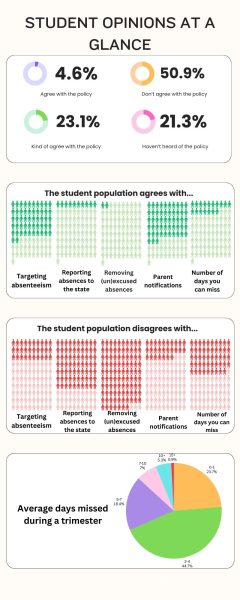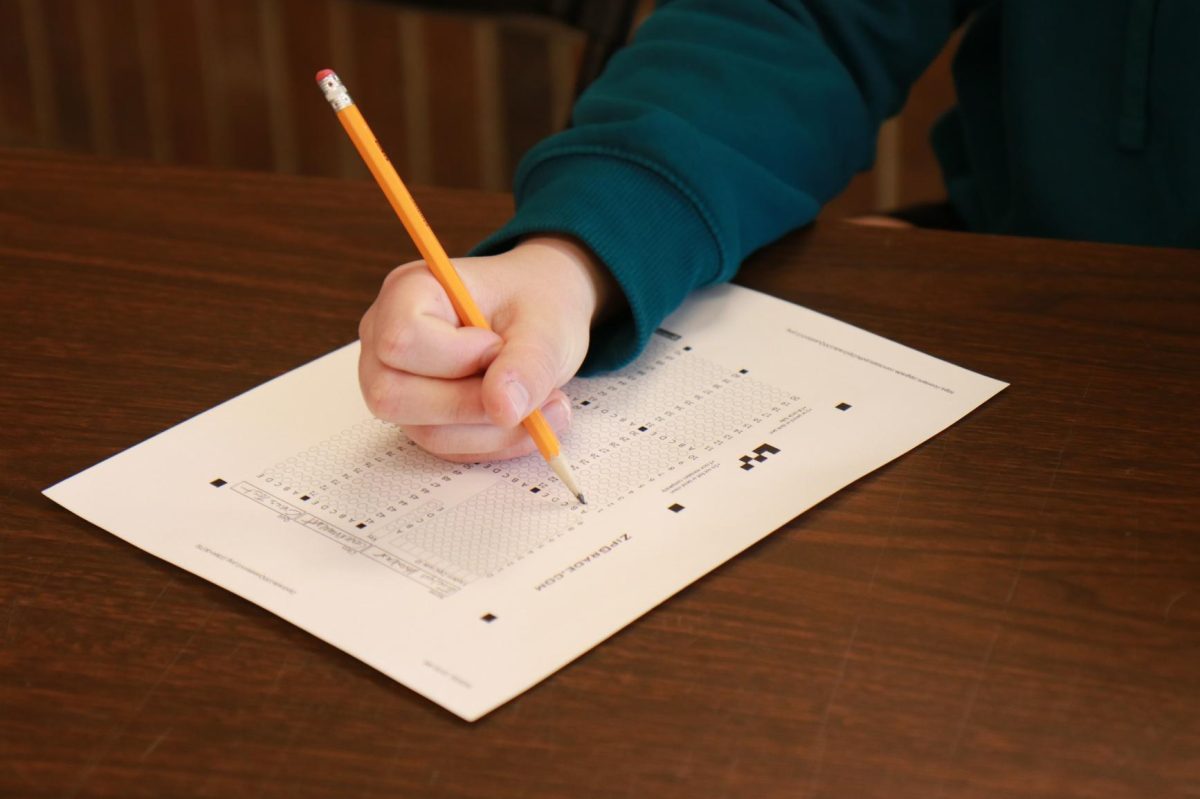Breaking down the new attendance policy

As construction dust settles from the projects started over the summer, the building isn’t the only thing changing this school year. In an email sent to families on Aug. 22, ICCSD Superintendent Matt Degner announced changes to the attendance policy to comply with the Iowa Department of Education’s new standards.
“Our main goal is for students to be in school daily and to confirm their safety with a parent or guardian if they are absent. While we understand absences may occur for reasons like illness, family activities, or appointments, the State of Iowa requires us to track the number of days missed, regardless of the reason,” Degner wrote.
Degner’s email is in response to Senate File 2435, signed into law May 9, which details actions public schools must take to address what the state refers to as ‘chronic absenteeism.’ This means reducing the number of students missing 10% or more of school days during a school year, regardless of the reason.
West will now be required to report all absences to the state. The Iowa Department of Education will track a student’s absences and notify parents and guardians if a student were to reach a certain percentage of absenteeism. The percentage is based on the number of absences in a specific grading period and will reset at the beginning of a new trimester.

At West and all ICCSD high schools, the first notification is a parent contact letting them know that their student has missed three days of school, which equates to 5% total absenteeism per trimester. The second notification, which states that the district is required to inform the county attorney, comes after a student has missed six days and reached 10% absenteeism. If a student reaches 15% absenteeism or nine absences, school administration will schedule a School Engagement meeting to create a plan to prevent further increased absenteeism. If the plan is not met, the county attorney may intervene with legal proceedings.
Student Support Coordinator Garrett Hartwig agrees with the policy, but also respects the rights of parents. “Kids need to be in school, but I’ll tell you honestly, like 99.9% of parents and guardians want their kids in school too,” he said.
Under the new policy, the district will remove the distinction between unexcused and excused absences. Every absence will be reported unless it falls under one or more of the six exceptions: 504 and IEP exemptions, a court-ordered exemption, medical absence, religious reasons or an administrative office exemption, which includes off-site access and school-related activities.
With each exemption, documentation is needed. West High has both 504 and IEP documentation on file as well as administrative office exemptions. This would include lists of students leaving for any school-related reason, such as rosters for sporting events and any documentation for offsite access. However, if a student is missing for a medical reason or court-ordered exemption, parents or guardians are required to provide the necessary documentation, such as a doctor’s note or legal document.
Although the policy includes the removal of the distinction between unexcused and excused absences, West will still be keeping track of whether or not a parent or guardian has contacted the school about their student’s absences. West Student Support Coordinator Garrett Hartwig explains that the safety of West students and their parents knowing where their student is remains a priority even if the reason for missing school does not align with one of the six exemptions.
“My concern is that the student is missing school, and the parent has no idea where their child is, like if they choose to head out for lunch somewhere, and they don’t come back. That’s a huge concern for me,” Hartwig said. “If a parent calls in and excuses their child without giving a reason, we will put that in our system as a communicated absence. We don’t have to worry about the student as a school, because the parent knows they’re gone, but that still registers in the state’s system towards the chronic absent point [if it does not fall under one of the six exceptions].”
While West is now required to follow the strict state guidelines, there’s the freedom to add guidelines to target specific problems at West. This includes the drop policy, which accounts for the number of times a student is absent from specific classes during a trimester.
Under this policy, a student can be dropped from a class if they meet certain attendance criteria. If a student reaches ten absences that were not communicated by a parent in a class, they can be dropped with an F or withdrawn from a class and not receive any credit. If a student has six non-communicated absences and a grade below 35% at the midterm, they can also face being dropped with an F or without credit. Specific consequences are dependent on when in the trimester a student was to reach those criteria.
Specific consequences can also be dependent on if the teacher believes a student can catch up on missed work. Hartwig works with both students and teachers to decide what is best for students in this position.
“If the teacher feels the student is capable of catching up on work that they’ve chosen to skip out on and complete the work that’s in front of them at the midterm, they stay in the class,” Hartwig said. “If the teacher feels like there’s no way they can get caught up on what they’ve missed and maintain the course load that’s ahead, then we will drop them with an F, and then what we do from there depends on the student.”
Hartwig also notes the differences between the new district policy and West’s drop policy when it comes to being identified as chronically absent. He also notes the difficulties of students only missing specific periods of the day.
“I think the hardest thing for me to deal with in my situation is when a student is in this in the building but is choosing to miss a specific class,” Hartwig said. “That will never get flagged by the state, in reality, because it would take a lot of missed classes to equate to one full day. [This is] where schools have a little bit of flexibility to enforce their own attendance policies.”
Early data from an anonymous WSS survey sent out to students shows that most students don’t agree with this new policy. 50.9% of 108 responses said that they don’t agree while just a small 4.6% said they did agree with it. While those numbers are substantial, there is still a bit of confusion within the student body, 21.3% of students said they hadn’t heard of it and 23.1% said they only kind of agree.

The confusion likely arises when students agree with some parts of the policy, such as the targeting of absenteeism and the introduction of parent notification, but disagree with others. 94.2% out of 103 responses said that they did not agree with the removal of unexcused and excused absences. Many students also disagreed with the requirement to report all absences to the state.
While there is a lot of disagreement, this data shows that most of the student body won’t encounter a problem with absenteeism as long as documentation is provided. 43.8% of students reported that they are usually only absent 2-4 times during a trimester, excluding school activities. Additionally, the most common reasons why students miss class are illness, school activities and appointments, which can fall under one or more of the six exemptions if documentation is provided.
Hartwig acknowledges the uncertainty among students and parents as the school year continues, hoping to ease some worries.
“This new policy seems like it’s something to fear, but in reality, it’s a good thing. I will say that probably 85% of our student body won’t even broach a 10% absence,” Hartwig said. “And I wish I could communicate to parents that, because I get a lot of calls, ‘I called in my child’s own excuse,’ and I say ‘Yes, they are, but you’re not unexcused by our standards at West because you know where your child is. You’re unexcused at the state level, but it’s one day. It takes 15 days of school to get to be a major concern.'”
Your donation will support the student journalists of West High School. Your contribution will allow us to purchase Scholarship Yearbooks, newsroom equipment and cover our annual website hosting costs.
-
 NewsWATER wins: 1440 hosts annual trivia night
NewsWATER wins: 1440 hosts annual trivia night -
 NewsService and sacrifice
NewsService and sacrifice -
 NewsThe truth behind Trump's tariffs
NewsThe truth behind Trump's tariffs -
 NewsMay news briefs
NewsMay news briefs -
 NewsWest Jazz bands perform at Friday Night Concert Series
NewsWest Jazz bands perform at Friday Night Concert Series -
 NewsWest High holds senior recognition awards night
NewsWest High holds senior recognition awards night -
 NewsIowa bill would require high school students to pass a citizenship test to graduate
NewsIowa bill would require high school students to pass a citizenship test to graduate -
 NewsTheatre West hosts annual Drama Awards, announces shows for next year
NewsTheatre West hosts annual Drama Awards, announces shows for next year -
 NewsBanned Book Club hosts first open mic at Coralville Public Library
NewsBanned Book Club hosts first open mic at Coralville Public Library -
 NewsWest High math team secures first place at national competition
NewsWest High math team secures first place at national competition -
 ShowcaseWSS 2025 People of the Year
ShowcaseWSS 2025 People of the Year -
 ShowcaseGone digital: the return of digital cameras
ShowcaseGone digital: the return of digital cameras -
 ShowcaseTop five sports moments of 2024-25
ShowcaseTop five sports moments of 2024-25 -
 ShowcaseDriven, dangerous and distracted
ShowcaseDriven, dangerous and distracted -
 ShowcaseClass of 2025 senior columns
ShowcaseClass of 2025 senior columns -
 ShowcaseWSS senior staff superlatives
ShowcaseWSS senior staff superlatives -
ShowcaseA year to remember: 2024-2025 in focus
-
 Showcase2025 Faculty Farewell
Showcase2025 Faculty Farewell -
 ShowcaseTraci Burns: a story of resilience
ShowcaseTraci Burns: a story of resilience -
 ShowcaseSeeds for change
ShowcaseSeeds for change

